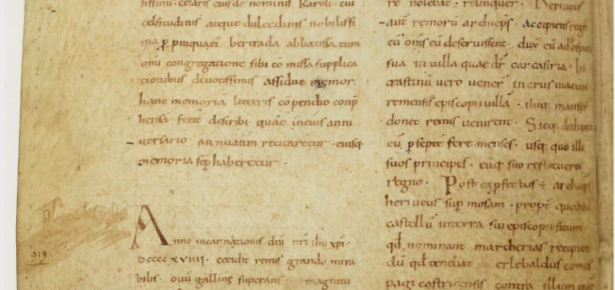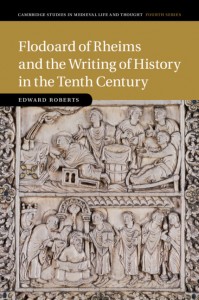
The decades following the demise of the Carolingian Empire in 888 were traditionally seen as a downward spiral of political fragmentation and cultural stagnation: a ‘mind-the-gap’ period between the ninth-century Carolingian achievement and the intellectual vibrancy and royal assertiveness of the eleventh and twelfth centuries. The humanist Lorenzo Valla famously described this period as ‘an age of iron and lead’. But the study of tenth-century Europe has been reframed over the last two decades, as demonstrated by a growing body of important new publications and ongoing major research initiatives such as After Empire, Rethinking Reform and The Transformation of the Carolingian World. Today ‘post-Carolingian’ Europe is increasingly viewed as a time of political formalisation, institutional take-off and cultural innovation – the creation of the Latin West and the European ancien régime, no less.
Yet there is arguably more to be said about how some of the period’s most important (but often little-studied) authors and texts can be interpreted in relation to these new frameworks for understanding the transition from the early to the high Middle Ages. I was prompted to write my new book, Flodoard of Rheims and the Writing of History in the Tenth Century, by a belief in the need to reinsert authorial agency and individuality into these narratives: to reconsider what contemporaries made of their time and how they presented it. Flodoard (d. 966), a canon of the cathedral of Rheims, was the only West Frankish (French) narrative historian of his day, so his writings are precious. He was also prolific, composing three lengthy historical works.
Perhaps because Flodoard is such a rare voice in this period, these histories have tended to be taken at face value. His Annals have been accepted as a plainspoken and passive chronicle of contemporary politics. The History of the Church of Rheims is frequently invoked as an unproblematic guide to the contents of the episcopal archive, of which Flodoard clearly made extensive use (and thereby preserved). Meanwhile, The Triumphs of Christ, a verse history of Christianity, is presumed merely to be a bewilderingly long (nearly 20,000 lines!) regurgitation of earlier Christian sources and has consequently barely been studied at all.
The way we understand the writing of history in a given period tends to have significant bearing on our conception of that period as a whole. The notion that Flodoard was an impartial, unassuming or mechanical historian implies that he couldn’t think for himself and thus embodies the traditional idea that the tenth century was an intellectual desert. Through a re-examination of the historian’s works in the contexts of his political career and literary milieu, I argue that this view of Flodoard is simplistic, and that he was in fact a far more self-conscious and innovative writer than he is normally given credit for. While Flodoard wrote history in decidedly traditional genres such as annales and gesta, the content and shape of his works were highly original. For instance, in each of his histories Flodoard occasionally wrote autobiographically, something which was extremely unusual in Carolingian historiography but anticipates the growth of authorial individuality and personality after the year 1000. Likewise, when Flodoard gathered the materials for his massive History of the Church of Rheims, he did not simply throw these together in chronological order. Rather he was a careful editor who selected what was useful to his purposes and disregarded what was not. Flodoard was scarcely a passive recipient and transmitter of tradition; he shaped historical and cultural traditions in response to urgent political questions that framed both his own career at Rheims and the actions of the wider West Frankish community.
For these and other reasons, Flodoard became an authority. In contrast to many of his Frankish predecessors who wrote histories that remained anonymous, his name became attached to each of his works. Moreover, Flodoard’s gloomy view of the early tenth century became canonical. He thought he was living through a period of decline and was worried by what he saw. How, then, should we interpret his witness? My book explores these issues, arguing that a closer look at Flodoard’s methods and mentality can yield valuable new historical and cultural perspectives on the so-called ‘age of iron’.
 Flodoard of Rheims and the Writing of History in the Tenth Century, is available now.
Flodoard of Rheims and the Writing of History in the Tenth Century, is available now.
Latest Comments
Have your say!